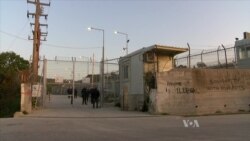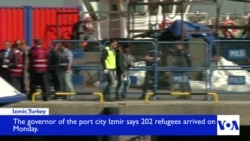Greece and the European Union began deporting migrants Monday from the islands of Lesbos and Chios, sending them to Turkey under terms of a controversial March deal between the EU and Ankara.
Despite predictions of violence, the departure of the first ferry from Lesbos early Monday happened without incident as a small number of protesters gathered at the port to condemn the deal.
Officials began moving busloads of people from the camp at Moria in the predawn hours and taking them to the port at the island’s main city, Mytilini, where they boarded a Turkish ferry for the short trip to Turkey.
A Greek government official told VOA that 202 people were deported aboard three ferries Monday. Two ferries left from Lesbos carrying 136 migrants, while a third ferry took 66 migrants from Chios. The official said none of those deported had applied for asylum. He said “almost all” of those sent back to Turkey on the first day of deportations were Pakistani, while two were Syrians who chose to go to Turkey for personal and family reasons.
As part of a swap with Turkey, the EU has pledged to rehouse one Syrian in the bloc for every one deported from Greece, with numbers capped at 72,000.
Forty-three Syrian asylum seekers were flown to Europe on Monday under that part of the deal. Thirty-two of them arrived in the northern German city of Hanover.
Eleven other refugees arrived in Finland, with more expected Tuesday in the Netherlands.
Reporters were not allowed close access to the departure, which took place under the cover of darkness, with officials declining to make public the times of departures or any other details before they happened.
The deal aims to break up the lucrative people smuggling operations that operate out of Turkey.
Turkey is readying itself for the return of hundreds of migrants under the agreement with the European Union.
In the early hours of Monday, VOA observed a number of buses entering Moria camp, the main detention center in Lesbos where Greek authorities, with the help of European Union border officials, are trying to ease overcrowding. The camp was built for 2,000 migrants but currently houses about 3,000.
Human rights groups concerned
Not long after the first boatload of deportees left Mytilini, human rights activists gathered to protest near the port entrance, where they competed for space with journalists. On the water, protesters held a banner between two boats that read “Ferries Are for Safe Passage, Not for Deportation,” before a Greek coast guard vessel approached and its crew ordered the protesters to end their demonstration.
Others on shore held signs reading “Stop the Dirty Deal,” and “Wake Up Europe.” At the request of an international television news crew, one group broke into chant, saying “EU, Shame on You.”
Demonstrators were infuriated by what they said was an attempt by Greek and EU officials to carry out what they view as a dirty deed, in an antiseptic, secretive fashion.
“It’s a shame what’s happening here. It’s a shame for all of European countries who are letting this happen,” a demonstrator from the Netherlands, who identified herself only by her first name, Mariella, told VOA. “We are not talking about export products. We are talking about people."
WATCH: First refugees arrive in Turkey
EU, Turkey agreement
The deal reached by the European Union and Turkey in mid-March grants $3.6 billion dollars in aid to Turkey in exchange for Turkey’s commitment to take back migrants, regardless of nationality, who arrived in Greece without inspection after embarking in Turkey.
People subject to deportation are those who arrived after March 20 and who are not eligible for, or do not want to apply for, asylum.
Still more migrants
Meanwhile, the influx of migrants continued. Officials said 300 arrived in Greece on Sunday alone, fueling complaints by the Greek government, which has accused Turkey of not doing enough to intercept the flow of illegal migrants.















